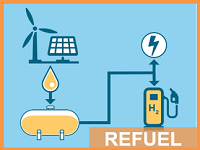REFUEL

Most liquid fuels used in transportation today are derived from petroleum and burned in internal combustion engines. These energy-dense fuels are currently economical, but they remain partially reliant on imported petroleum and are highly carbon intensive. Alternatives to internal combustion engines, like fuel cells, which convert chemical energy to electricity, have shown promise in vehicle powertrains, but are hindered by inefficiencies in fuel transport and storage. Projects in the Renewable Energy to Fuels Through Utilization of Energy-Dense Liquids (REFUEL) program seek to develop scalable technologies for converting electrical energy from renewable sources into energy-dense carbon-neutral liquid fuels (CNLFs) and back into electricity or hydrogen on demand. REFUEL projects will accelerate the shift to domestically produced transportation fuels, improving American economic and energy security and reducing energy emissions.
Carbon-neutral liquid fuels as defined by REFUEL are hydrogen-rich and made by converting molecules in the air (nitrogen or carbon dioxide) and hydrogen from water into an energy-carrying liquid using renewable power. While existing fuel-cell electric vehicles (FCEVs) use pure hydrogen as a fuel, the limitations of hydrogen storage and transportation have made it difficult and expensive to build transmission, distribution, and refueling infrastructure for mass adoption of these vehicles. The CNLFs of REFUEL address these challenges by using the infrastructure already in use by traditional liquid fuels. Once the CNLF arrives at its point of use, it can be used to generate electricity in a fuel cell or produce hydrogen on demand, greatly reducing transportation and storage costs.REFUEL projects will aid in the development of energy sources that are readily produced and easily transported, like ammonia, while reducing production costs and environmental impact. Projects will enable new, efficient, scalable and cost-effective energy delivery when and where it is needed.
If successful, developments from REFUEL will enable energy generated from domestic, renewable resources to increase fuel diversity in the transportation sector in a cost-effective and efficient way.
The U.S. transportation sector is heavily dependent on petroleum for its energy. Increasing the diversity of energy-dense liquid fuels would bolster energy security and help reduce exposure to energy imports
Liquid fuels created using energy from renewable resources are carbon-neutral, helping reduce transportation sector emissions.
Fuel diversity reduces exposure to price volatility. By storing energy in hydrogen-rich fuels instead of hydrogen in pure liquid or gaseous form, transportation costs can be greatly reduced, helping make CNLFs cost-competitive with traditional fuels.
For a detailed technical overview about this program, please click here.


